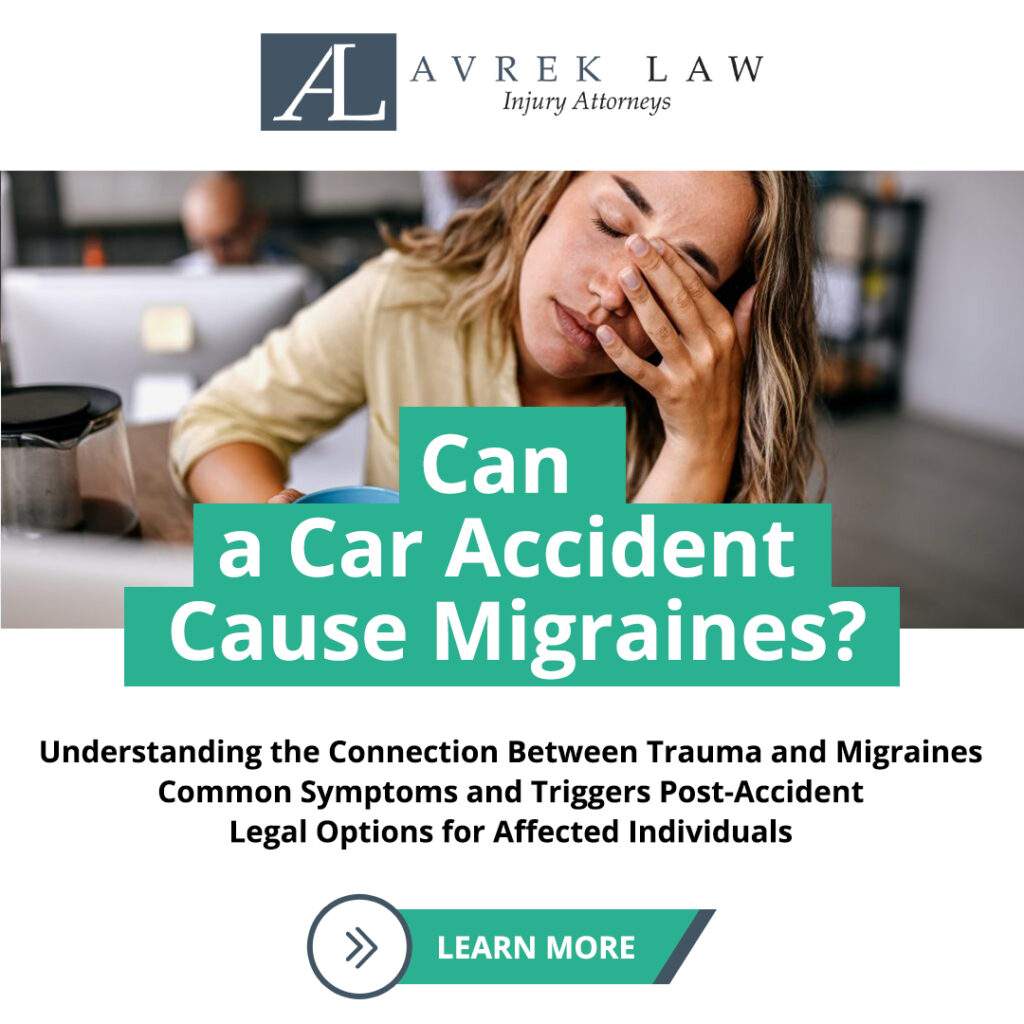When it comes to auto accidents, people are mostly concerned with immediate and obvious injuries, such as broken bones and lacerations. However, it is not unusual to have lingering aches and pains following an accident. One particular pain to pay attention to is headaches following a car accident. For those wondering, “Can a car accident cause migraines?,” it is important to look at the risk factors of head injuries following a collision. Knowing this can help you decide if you need to seek compensation for your migraines, just as you would any other accident-related injury.

If you’re experiencing headaches or other symptoms after a car accident, it’s essential to consult with a car accident attorney or auto accident lawyer. They can evaluate your case and help you pursue the compensation you deserve for your injuries.
The Difference Between a Headache and a Migraine
It isn’t uncommon to experience head pain after an accident either immediately or in the following days. The term “headache” is often used as a catchall phrase for head pain. However, a migraine is different. It is defined by the American Migraine Foundation as a neurological disease brought on by factors such as trauma to the head, neck, or spine.
Migraines are more chronic problems than typical headaches and can be differentiated by the following:
- Pulsing pain
- Often pain is local to one side of the head
- Nausea and/or vomiting
- Dizziness
- Double vision
- Sensitivity to light and/or sound
- Trouble concentrating
- Symptoms increase with physical activity
The body’s immediate response to an accident is to release adrenaline to protect itself. This means you might not feel any pain right away. After an accident, you will want to seek immediate medical attention to determine any injuries that might lead to ongoing issues with migraine.
What to Expect Physically After a Car Accident
From fender benders to major collisions, no two car accidents are the same. Collisions can result in a variety of injuries depending on a number of factors. This includes:
- Speed of the car (or cars) at the time of the accident
- Whether or not seat belts were in use
- Whether or not airbags were deployed
- Type of car (or cars) involved in the crash
How people feel physically after an accident will vary from minor symptoms of whiplash to more severe head injuries, such as traumatic brain injury (TBI). According to the latest brain injury facts and statistics, more than 64,000 people died from TBI-related deaths in 2020. Auto accidents were a leading cause of injury. Migraines follow under the umbrella of a TBI.
Can a Car Accident Cause Memory Loss?
While it is not an official symptom of migraines, memory loss is related to having a TBI. The trauma of an accident can lead victims to being confused, however, it is not normal to suffer any form of total memory loss. This could be a sign of a serious brain injury, just like migraines.
There are three primary types of memory loss that accidents can cause:
- Post-traumatic amnesia. This is a state of memory loss that occurs immediately following an accident.
- Anterograde amnesia. This is the inability to form new memories following the accident and is the most common memory loss for car crash victims. People who suffer from this often refer to it as “blacking out.”
- Retrograde amnesia. This is losing memories prior to an accident including events leading up to the collision and even major life events.
If you’ve suffered any form of a TBI–migraines or memory loss– in a car accident where you were not at fault, you may be eligible for compensation. Stop wondering “Can a car accident cause migraines?” Instead, contact a traumatic brain injury lawyer to determine your next course of action.
Avrek Law car accident lawyer, is here to help you navigate the process. With more than 50 years of combined experience resolving cases in favor of clients who were wrongfully injured. Avrek Law has recovered Over $2 Billion in compensation for injury victims in Over 63K cases. Contact us at 866-598-5548 for your free consultation with an experienced auto accident attorney in San Bernardino County to learn more!
How much is your case worth?
Get a free case evaluation